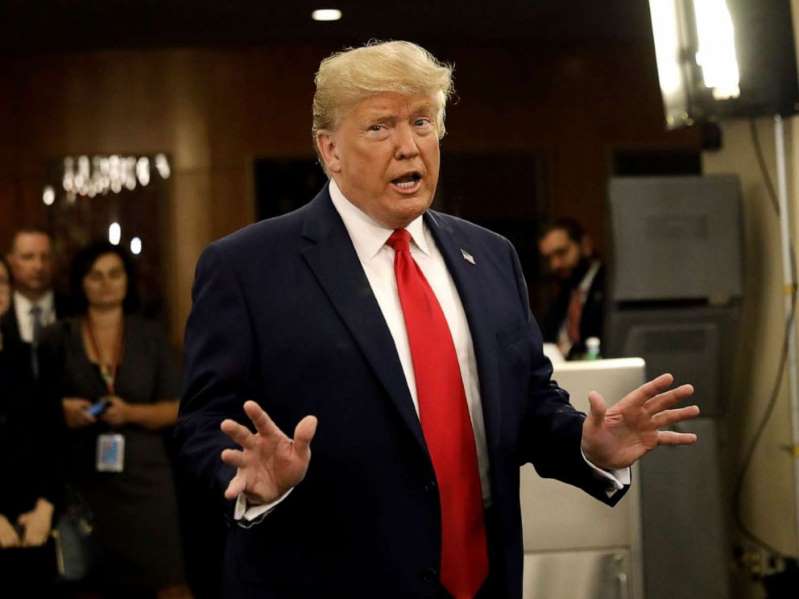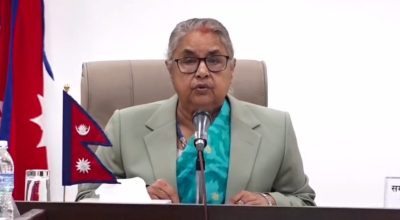
WASHINGTON (AP) — President Donald Trump is promising to put forth a female nominee in the coming week to fill the Supreme Court vacancy created by the death of Justice Ruth Bader Ginsburg, pushing the Republican-controlled Senate to consider the pick without delay.
Taking the stage Saturday night at a North Carolina rally to chants of “Fill that seat,” the president said he would nominate his selection despite Democrats’ objections. And, after conducting what he joked was a “very scientific poll” of the Fayetteville crowd as to whether supporters wanted a man or a woman, he declared the choice would be “a very talented, very brilliant woman.”
He added that he did not yet know whom he would choose.
“We win an election and those are the consequences,” said the president, who then seemed to signal that he’d be willing to accept a vote on his nominee during the lame-duck period after the election. “We have a lot of time. We have plenty of time. We’re talking about January 20th.”
But one Republican senator had already broken ranks. Maine’s Susan Collins, who is in a tough reelection battle, said earlier Saturday that she believed replacing Ginsburg should be the decision of the president who is elected Nov. 3. Three more defections from the GOP ranks would be needed to stop Trump’s nominee from joining the court.
At stake is a seat held by a justice who was a champion of women’s rights and spent her final years on the bench as the unquestioned leader of the court’s liberal wing. Senate Majority Leader Mitch McConnell, R-Ky. vowed to call a vote for Trump’s nominee, but Democrats countered that Republicans should follow the precedent that GOP legislators set in 2016 by refusing to consider a Supreme Court choice in the run-up to an election.
The impending clash over the vacant seat — when to fill it and with whom — scrambles the stretch run of a presidential race for a nation already reeling from the pandemic that has killed nearly 200,000 people, left millions unemployed and heightened partisan tensions and anger.
McConnell pledged to Trump in a phone call Friday night to bring the choice to a vote though he has not said if it would be before the election.
Democratic presidential nominee Joe Biden said any selection should come after Nov. 3. “Voters should pick the president and the president should pick the justice to consider,” he said. Biden has promised to nominate a Black woman to the high court if given the chance, but he has said he will not release names of possible nominees before the election.
Trump this month added 20 more names to his roster of potential court nominees, and aides in recent days have focused on a short list heavy on female candidates, according to four White House aides and officials close to the process. They spoke on condition of anonymity because they were not authorized to publicly discuss private conversations.
Those under close consideration for the high court include three women who are federal appeals court judges: Amy Coney Barrett, beloved among conservatives and an early favorite; Barbara Lagoa, who is Hispanic and comes from the battleground state of Florida; and Allison Jones Rushing, who clerked for Justice Clarence Thomas and for Neil Gorsuch, when the current Trump-appointed justice was an appeals court judge.
At least one man, appeals court Judge Amul Thapar, has also been under consideration. A McConnell ally from Kentucky, he has been screened by Trump’s team for past openings and he would be the first Asian American on the high court.
McConnell, who sets the calendar in the Senate and has made judicial appointments his priority, declared unequivocally in a statement that Trump’s nominee would receive a confirmation vote. In 2016, McConnell refused to consider President Barack Obama’s nominee months before the election, eventually preventing a vote on Judge Merrick Garland.
Senate Democratic leader Chuck Schumer of New York convened a conference call with Democratic senators at midday Saturday, according to a person on the private call who was not authorized to discuss it publicly and spoke on condition of anonymity. He told senators the “No. 1 goal” must be to communicate the stakes of the confirmation vote.
Schumer also warned that if Republicans push through the nominee, “nothing is off the table” for Senate rules changes to come, the person said.
Ginsburg’s death seemed certain to stoke enthusiasm in both political parties as the election could now be viewed as referendum on the high court’s decisions, including the future of abortion rights. Democrats raised more than $71 million in the hours after Ginsburg’s death, indicating her passing has already galvanized the party’s base.
Hundreds of mourners gathered for a second night outside the Supreme Court building, holding candles in honor of Ginsburg and listening to a succession of testimonies and rallying speeches. Among the speakers was Sen. Elizabeth Warren, D-Mass., who eulogized Ginsberg as “an icon, a trailblazer and a friend” and accused McConnell of seeking to cynically hijack the confirmation process.
“Today Mitch McConnell and his henchmen think they can ram through a Supreme Court justice only 45 days before the election,” Warren said. “What Mitch McConnell doesn’t understand is that the fight has just begun.”
A confirmation vote in the Senate is not guaranteed, even with a Republican majority.
McConnell has launched a risky, unprecedented strategy. It could motivate conservative voters to rally behind Trump and GOP senators or it could push away moderates who prefer to see the Senate stick to norms or are fearful of a right-leaning court stripping away women’s right to choose an abortion.
Typically, it takes several months to vet and hold hearings on a Supreme Court nominee, and time is short before November. Key senators may be reluctant to cast votes so close to the election. With a slim GOP majority, 53 seats in the 100-member chamber, Trump’s choice could afford to lose only a few.
McConnell did not specify the timing. But trying for confirmation in a lame-duck session after the Nov. 3 election, if Trump had lost to Biden or Republicans had lost the Senate, would carry further political complications.
Democrats immediately denounced McConnell’s move as hypocritical, pointing out that he refused to call hearings for Garland 237 days before the 2016 election. The 2020 election is 46 days away.
The average number of days to confirm a justice, according to the Congressional Research Service, is 69, which would be after the election. But some Republicans quickly noted that Ginsburg was confirmed in just 42 days. Obama waited more than a month to nominate Garland after Justice Antonin Scalia died in February 2016.
John Fischetti, who waited in line more than two hours to enter Trump’s Fayetteville rally, said replacing Ginsburg would inflame tensions but was within the president’s rights.
“I would assume it would make everyone more energized,” Fischetti said of the political repercussions. “Trump’s people want him to always press forward.”
Four GOP defections could defeat a nomination, while a tie vote could be broken by Vice President Mike Pence. After Collins’ decision, focus grew on Sens. Lisa Murkowski of Alaska and Mitt Romney of Utah, who have been critical of Trump and protective of the institution of the Senate.
And because the Arizona Senate race is a special election, that seat could be filled as early as Nov. 30 — which would narrow the window for McConnell if the Democratic candidate, Mark Kelly, wins.
The next pick could shape important decisions beyond abortion rights, including any legal challenges that may stem from the 2020 election. In the interim, if the court were to take cases with eight justices, 4-4 ties would revert the decision to a lower court; for instance, the Affordable Care Act could then be struck down by a lower Texas court.













